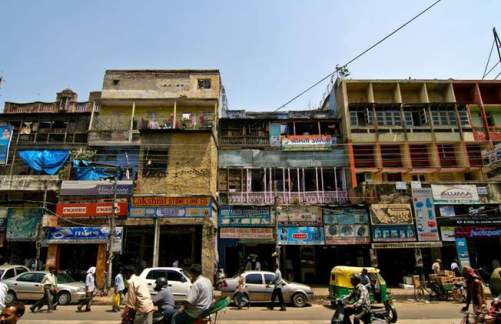Every 7 April, the world commemorates 'World Health Day' under the sponsorship of the World Health Organization. UNODC contributes a story of female sex workers who take steps to address HIV and improve health in the red light district. UNODC will launch on this day its World Drug Campaign (WDC), which focuses on youth and health.
India: Promoting health in Delhi's 'red light' district

The Garstin Bastion (G.B.) Road in New Delhi, India is known as the largest 'red light' district in the capital. Situated in the heart of the city near old Delhi railway station, amidst Asia's biggest hardware market, it is a world of its own. Along the 800 meter long stretch, stand 24 dilapidated multi-story buildings with steep, dingy stairs and corridors that are home to an estimated 3,000 female sex workers. A total of 93 rooms in these buildings function as brothels.
Nearly 5 per cent of the total sex workers' population in this area is HIV positive. 40 per cent of their clients are drug users and there are above 600 injecting drug users. Sex workers are a high risk group as they are often not in a position to negotiate for safe sex. This makes G.B road a breeding ground for the spread of HIV. Therefore, a centre that provides integrated health care services coupled with outreach is essential.

Under the National AIDS Control Programme III, Delhi State AIDS Control Society (DSACS) works with organizations like Shakti Vahini and Indian Medicine Development Trust, to provide these women, their co-dependants and clients with comprehensive health care facilities under one roof. The target intervention is focused on five brothels which constitute 49 per cent of the entire sex workers' population.
The two organizations are based in one of the buildings in which an Integrated Counselling and Testing Centre' (ICTC) clinic is set up. It helps in conducting HIV diagnostic tests, provides basic information on the modes of HIV transmission, recommends referrals, counsels the clients on sexually transmitted infections (STI) and promotes behavioural change to reduce HIV vulnerability. Almost 60 per cent of the women who work in the brothels are affected by STI. In the last six months alone, the NGOs referred 753 women to the clinic.
 In addition, the organisations train the sex workers as outreach workers to advocate for prevention of HIV. The outreach workers visit the brothels and spread messages on condom use, safe sexual practices, how to negotiate with clients for safe sex and where condoms can be accessed. They also reach out to the potential clients, vendors, pimps and even the shop keepers. One of the outreach workers proudly says, "no condom, no sex!"
In addition, the organisations train the sex workers as outreach workers to advocate for prevention of HIV. The outreach workers visit the brothels and spread messages on condom use, safe sexual practices, how to negotiate with clients for safe sex and where condoms can be accessed. They also reach out to the potential clients, vendors, pimps and even the shop keepers. One of the outreach workers proudly says, "no condom, no sex!"
Ms. Ritu Monidas, project manager with Skati Vahini explains, "The total client load in a day at G.B. road is close to 8,052 and on average each woman in the brothels entertains 4 clients per day. They use 8,441 condoms per day that are supplied by DSACS. We have set up condom vending machines throughout G.B road for easy access at all times. These women have come a long way and understand that prevention is imperative for good health. This itself is remarkable- a step for us - a leap for G.B road!"
UNODC works with the National AIDS Control Organization (NACO), Government of India, on prevention of HIV among drug users. Recently UNODC organized a visit, for a delegation of Government officials from Afghanistan who visited India to learn on NACO's work, to the above mentioned target intervention site.